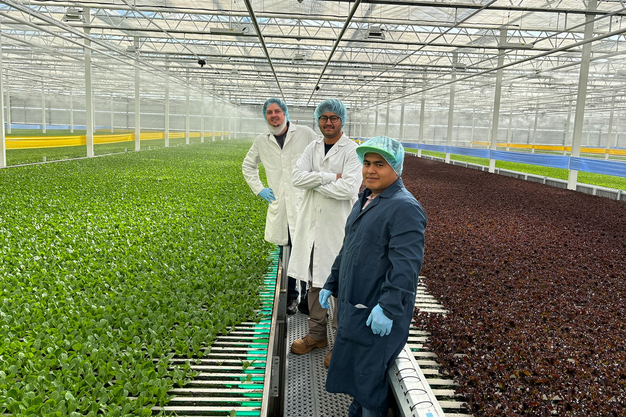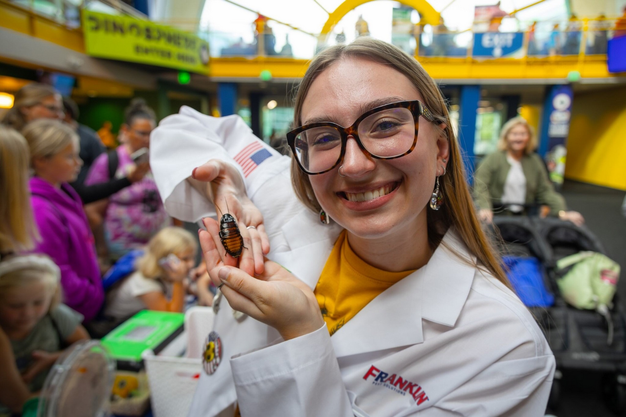Approximately 86% of students in the College of Agriculture participate in internships during their time at Purdue. While this is an impressive number, it doesn't begin to capture all the ways internships shape lives and careers. To do that, here are the stories of four recent Purdue alumni who used their experiences to cultivate their own futures post-graduation.
Hari Thirumalai, Pure Green Farms
Hari Thirumalai started full-time work this summer as a grower apprentice at Pure Green Farms, where he had previously interned.
After his second internship at Ste. Michelle Wine Estates, Thirumalai returned to Purdue and reflected on his various experiences working with growers.
"It's been an interesting journey," Thirumalai said. "I spent a lot of time at Purdue working in the greenhouses around research. Then my internship at Pure Green Farms exposed me to a 3-acre, high-production hydroponics facility. After that, I switched to field production of wine grapes at Ste. Michelle, which contracts well over 30,000 acres. It was a big change, in terms of acreage and growing methods."
When Thirumalai was offered a full-time position at Pure Green Farms, he accepted. Even though he enjoyed his internship with Ste. Michelle, he found that he preferred the responsibilities and challenges of the greenhouse production facility.
 Hari Thirumalai (middle) poses with his coworkers surrounded by thousands of lettuce plants
Hari Thirumalai (middle) poses with his coworkers surrounded by thousands of lettuce plants
"It's interesting to see the way I view things now, how I prioritize certain issues and the way I look at plants," Thirumalai said. "For example, with crop scouting or pest scouting, you always want to have a big picture mentality. If you go out and look for specific problems, you will find one that's not representative of the whole farm. It's not efficient to waste a bunch of resources to fix that one issue. I learned that from working with wine grapes, and it's still relevant now."
As a grower apprentice, Thirumalai has more responsibility than before, but he feels at home in the new role.
Thirumalai's team has also eased his transition into the new role by answering questions and helping him learn. As a result, Thirumalai has become more knowledgeable about the 6,500 pounds of lettuce the farm produces daily. He looks forward to learning even more about the crop and becoming a seasoned grower.
Kayla Hinton, The Clorox Company
Kayla Hinton has found a new "fit" with the Clorox Company as a supply chain leadership development program associate. She loved many things about her internship with Proctor and Gamble (P&G), and she was curious about other careers within the industry.
"After working at P&G, I realized that I was not as interested in the R&D, or research and development, side of things," Hinton said.
Hinton heard from friends that Clorox offered a rotational program that gave employees experience in multiple areas. Interested, she talked to a Clorox representative, who happened to be a Purdue alumnus, at the Industrial Roundtable career fair. Many interviews and many months later, Hinton had the job.
"Clorox has always been in the back of my mind as another consumer-packaged goods company," Hinton said. "It's an industry that I want to work for because there are a lot of young people who work in that field, and it has a progressive work culture."
Hinton says that in many ways the work culture at Clorox is similar to P&G's, yet it's more progressive in other ways. "Clorox wants you to do your work however that looks for you," Hinton said. "No one is checking the exact time you clock in or out, and they're flexible with letting you work from home. Everyone here is doing their job in their own way, and everyone I've met so far is doing their job well. I love the people and the environment here."
Hinton also appreciates how welcoming her coworkers have been. "Random people walk up to me and ask me if I need help with this, or if I understood this in a meeting, or if I know what this acronym means," Hinton said. "I have felt very much like everyone expects me to succeed and is helping me get there."
Looking forward to the future, Hinton says her job "is better than I could have imagined my first job out of college could ever be. Somehow, this is exactly what I was looking for in a company, and I didn't know it until I started working there. It's a pretty true fit."
Allison Beach, Rose Pest Solutions
Allison Beach wanted to continue working in urban entomology after graduation, and she has been able to do that with the Chicago-based company Rose Pest Solutions (also known as Franklin Pest Solutions in Indiana). Beach works as a technical specialist, which means that customers and colleagues go to her for insect identification and expertise.
Beach sees her role as a culmination of the experiences she had at Purdue and in internships.
"My internship with the Indiana Department of Health taught me a lot about bugs in an urban area," Beach said. "I was not out in the country; I was in these concrete establishments with bugs that could potentially cause disease. It was a good introduction to urban pests and the weird places they can be."
 Allison Beach shows off a cockroach to people at the Indianapolis Children's Museum with Rose (Franklin) Pest Solutions
Allison Beach shows off a cockroach to people at the Indianapolis Children's Museum with Rose (Franklin) Pest Solutions
After her internship with the Department of Health, Beach worked on a data-entry project for Purdue and the Department of Defense that familiarized her with pesticides.
"Essentially, I was helping to establish and populate a database of pesticides for the military," Beach said. "I learned a lot about pesticides: what the names of them are, how they're categorized by the Environmental Protection Agency, and how they're usually administered. When I saw people using them at Rose Pest Solutions and during my training, I recognized a lot of the pesticide names from the database."
This knowledge helped Beach to connect with a recruiter for Rose Pest Solutions at a College of Agriculture career fair. The rest is history.
Now, Beach teaches other people the things she has learned.
Beach hopes to attend graduate school in the future, but until then, she is working towards accreditation that will earn her the title of "Board Certified Entomologist (BCE)," a step up from being a technical specialist. As she works to get her own accreditation, she's training professionals at Rose Pest Solutions so that they can earn accreditation from the Entomological Society of America as "associate certified entomologists."
Bryn Yoder, PhD student
After her internship with EnviroLogix, Bryn Yoder made up her mind to attend graduate school to pursue a PhD in biochemistry.
"I talked to Mary, one of my mentors, in-depth about whether I wanted to go to grad school, and she helped me make my decision," Yoder said. "Something she said that stuck with me is that she didn't have that opportunity to go to grad school, but if she had the opportunity, like I did, she would have gone. I'm so lucky to be where I am today."
When Yoder returned to Purdue, she reached out to faculty for advice and began turning in graduate school applications. A few months later, she accepted an offer from North Carolina State University, where she continued to study biochemistry and build on her undergraduate research experiences.
"It's been a smooth transition for me, I think specifically because of my research advisor at Purdue, Dr. Hana Hall. She treats her undergrads with the same level of freedom as a grad student would have. I had a lot of control over my research, which is uncommon for a lot of undergraduate research," Yoder said.
Interning in industry also helped Yoder to feel comfortable in the grad school environment.
"My internship at EnviroLogix was great because I got to work mostly independently in research and on a larger scale," Yoder explained. "It gave me a look at what 40 hours a week in a lab looks like, which was helpful going into graduate school because that's what I do now. I realized I loved lab work and the research."
Yoder loves her grad school research, but she also enjoys "making connections with so many like-minded but also different people," who "all come from different background and experiences."
After graduation, Yoder hopes to get a job in the pharmaceutical industry in drug research and development, where she can continue exploring her interests in human health.
Source: Purdue University
